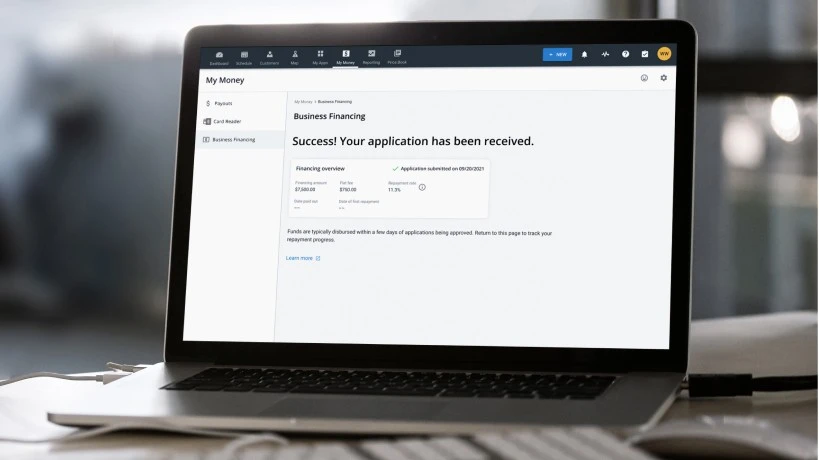
One thing is for certain. As long as there are hot days and cold days, there will always be the need for heating and air conditioning systems. The summer sun can warm homes to a temperature that is not all that comfortable for day-to-day habitation. And in the winter, temperatures can get so low in many geographies that even your favorite sweatsuit and fuzzy socks won’t keep you warm without the help of a reliable heating system.
That’s why getting into the HVAC business is so lucrative. There will always be a demand! That said, you can’t just jump into a new HVAC business without a solid business plan and plan for your business operation. You need to have a solid approach to HVAC business management. And in this article, we’ll share some tricks of the trade that we have picked up along the way.
13 Top HVAC Business Management Tips
So, we know you are wondering—just what do we mean by business management, anyway?
Good business management involves a variety of tasks to help your HVAC company run well and grow. This means handling your money, advertising your services, improving your daily work, and keeping your customers happy. By following these tips, you can make sure your HVAC business is successful for a long time and stays ahead of others. Remember, your competition is everywhere.
1. Develop a Comprehensive Business Plan
We get it. Creating a business plan can be a long and intimidating process. But trust us, the juice is worth the squeeze here. Your business plan will not only help you should you need small business financing, but it will also help keep you and any members of your team marching to the same drum.
A business plan includes your goals, how you will reach them, and what resources you need. It covers things like your target market, pricing, and competition. With a clear plan, you can make better decisions and stay on track, helping everyone to know their role and work together smoothly.
2. Invest in Quality Training and Certification
When customers are calling you to service their HVAC systems, they are trusting you in their homes. They also want to know they are working with someone who is not only certified, but has the right skills to get the job done the first time. Hiring someone to tune up their HVAC can easily cost $70 to $200 or more. And those annual service costs are likely to average $150 to $300. For that reason, customers want to know that they’re getting the best possible technician.
However, it is important to know that this training is just as important for you as the HVAC business owner and for your staff. Don’t consider your certification and initial training as a one-and-done thing. Stay on top of training materials to make sure your entire team is skilled in the latest and greatest.
3. Hire Highly Qualified Team Members
Many HVAC business owners offer apprenticeships to up-and-coming service technicians. And, we highly encourage that practice. It’s one of the best ways to help your team provide a consistent level of service to each and every one of your customers.
That said, building a great team starts with bringing the right people on board. So don’t just hire anybody and everybody. Ask thoughtful questions during the interview process to make sure you get someone who will be committed not just to your organization but to your customers as well. Lastly, do your homework on technician salaries in the area to make sure your team is compensated not just fairly, but competitively.
4. Use HVAC Management Software
One mistake that many new HVAC business owners make is an over-reliance on manual processes. And we understand the argument against doing anything different—before technology was as prevalent as it is today, business owners in just about any trade relied on manual processes.
But the truth is that times have changed. Today’s customers have demands. They want convenience and they want service fast. And those manual processes of yesteryear don’t always align with those expectations. That’s why leveraging HVAC management software and field service management software can come in so handy.
These tools can help you with just about everything you need to keep your business operating effectively. You can use HVAC software for scheduling, dispatching, customer estimates, invoicing, payments, online review management, and there are so many more features beyond that for you to explore. The team at Housecall Pro highly suggests use of these tools as one of our top HVAC business management tips.
5. Build a Robust Marketing Strategy
Gone are the days when you could rely on drive-bys or an ad in the local paper or Yellow Pages to grow awareness about your business. Not only is there a lot of competition out there—about 145,142 in the U.S. alone as of 2023—but your customers need to know how to find you. With more and more people working remotely, those drive-bys just don’t happen like they used to. And newspaper ads? Effective, but not as much as other channels that you should pursue.
Your marketing strategy should include a strong online presence with a professional website, active social media profiles, and local SEO to help customers find you. Use email marketing to keep in touch with clients and offer special promotions. Don’t forget about online reviews and testimonials, which can build trust. Consider digital ads on platforms like Google and Facebook to reach a wider audience.
6. Build a Strong Online Presence
Speaking of a marketing strategy, one of the key components needs to be your online presence. Today’s customers search for businesses online, checking out websites and social media. A great website is so important as it can provide up-to-date information on products, pricing, and promotions.
Additionally, SEO (Search Engine Optimization) helps your site appear in search results, attracting more visitors. Having a mobile app is also important, allowing customers to book services, check service contracts, and see the latest promotions. Remember, an online presence goes beyond your website. Active social media profiles, regular content updates, and effective online review management all build trust and engagement with your audience.
Get In Touch: 858-842-5746
Let us earn your trust
On average, Pros increase monthly revenue generated through Housecall Pro by 50% after their first year.
See plan options and feature breakdown on our pricing page.
7. Focus on Delivering the Best Customer Service
While we shared earlier that there will always be a demand for those in the HVAC business, we also acknowledged that there is a lot of competition out there. Ask any homeowner and they can probably rattle off three or four HVAC companies in their community. That’s why it is so important that you stand out from the crowd—in a good way.
Providing excellent customer service is a great way to do this. Consider the following two scenarios:
- HVAC technician comes out, successfully repairs the unit, provides a copy of the invoice, thanks the customer, and departs.
- HVAC technician comes out, successfully repairs the unit, shares tips and recommendations, including DIY tricks to maintain the unit, offers a low-pressure sales introduction to service plan options, recommends the next service date, keeps the customer updated throughout the process, thanks the customer, and departs. After the service appointment, a survey is sent out asking the customer for their feedback.
Ultimately, in these two situations, both HVAC techs did a great job. They did what they were called on to do—fix the unit. But, the second HVAC technician went out of their way to keep the customer informed, offer tips to help the customer save money, but also let them know that their company can handle any future service needs. And they were especially polite throughout the process. It’s this second technician that the customer is more likely to remember and call on in the future.
8. Optimizing Scheduling and Dispatching
Remember how we mentioned earlier that today’s customers want service now, and they don’t have to wait. While this doesn’t mean that you need to arrive five minutes after they call, you should have some sort of scheduling system in place that allows you to be prompt and reliable.
Customers get frustrated when technicians arrive late or when they have to wait for a 6-8 hour window. A smart scheduling and dispatching system can help you provide more accurate arrival times. This reduces customers’ waiting time and improves their overall experience with your service. And this ultimately leads to higher satisfaction and more repeat business.
9. Stay on Top of Key Performance Indicators (KPIs)
Every business has metrics that they can watch to see how they are performing. In the HVAC space, common KPIs include:
- Customer satisfaction scores
- First-time fix rate
- Average response time
- Job completion time
- Revenue per technician
- Number of service calls per day
- Customer retention rate
- Maintenance contract renewal rate
- Inventory turnover rate
Tracking these KPIs regularly helps you understand where your business is excelling and where improvements are needed. Use software tools from Housecall Pro to monitor these metrics and generate reports.
Analyzing this data allows you to make informed decisions to improve efficiency and profitability. Additionally, showcasing impressive KPIs in your marketing materials can help attract new customers by proving your business’s reliability and success.
10. Offer Maintenance Plans
While there are definitely some DIY things that homeowners can do to help maintain their HVAC system, the chances are that they will need professional help once in awhile. After all, with the average cost of an HVAC system ranging between $5,000 to $12,000, the last thing a homeowner wants is to find out that the reason they need to buy their system is something they could have avoided.
This is why maintenance plans are so important in the HVAC space. But, some words of caution here—many customers are skeptical of these plans. There is a lot of negative press out there about service contracts and all the fine print, extended warranties that don’t really cover much at all, and so on. So, you need to make sure your maintenance plans provide the services that customers need, at a price that is profitable for you yet lucrative enough for your customers to want to bite.
Here are some tips for developing the best HVAC maintenance plan.
- Keep the Fine Print to a Minimum: Ensure your maintenance plans are clear and straightforward. Avoid confusing terms and conditions that can make customers wary. Transparency builds trust.
- Offer Tiered Plans: Provide different levels of service to cater to various customer needs and budgets. This allows customers to choose a plan that best fits their requirements and financial situation.
- Include Essential Services: Make sure your plans cover the most critical maintenance tasks, such as regular inspections, cleaning, and minor repairs. This helps prevent costly breakdowns and extends the lifespan of HVAC systems.
- Highlight the Savings: Emphasize how regular maintenance can save customers money in the long run by preventing major issues and improving energy efficiency. Use real data and testimonials to back up these claims.
- Provide Added Benefits: Offer perks such as priority service, discounts on repairs, and extended warranties for maintenance plan subscribers. These added benefits can make your plans more attractive and valuable to customers.
11. Stay Up to Date on Industry Trends and Technology
Customers want to know that you are up to date on new systems, local inspection requirements, and more. Plus, the big HVAC manufacturers are releasing new makes and models all the time, and each one is surely to be the best of the best. Customers need assurance that you know how to maintain and service those units, and they also want to know you can take care of their older unit, especially if it is still running well despite being a dinosaur.
Here are some ways to stay up to date on HVAC industry trends and technology:
- Attend Industry Conferences: Participate in HVAC trade shows and conferences to learn about the latest products and technologies.
- Join Professional Associations: Become a member of HVAC associations to access resources, training, and networking opportunities.
- Subscribe to Industry Publications: Consider these facts: Bill Gates reads one book per week. Elon Musk is an avid reader. Mark Zuckerberg reads one book every two weeks. That tells you something, right? Entrepreneurs take the time to read and grow, and they do it often. So, make sure that you, too, regularly read HVAC magazines and journals to stay informed about new developments and best practices.
- Engage in Continuous Training: Take advantage of online courses and certifications to keep your skills current.
- Network with Peers: Connect with other HVAC professionals to share knowledge and experiences about emerging trends and technologies.
12. Manage Your Inventory Effectively
Managing your inventory effectively is so important to avoid customer disappointment. Imagine a customer needing an urgent HVAC repair, only to find out you don’t have the right part in stock and can’t get it for a week. This can damage your reputation and lead to lost business.
While it’s impossible to stock every part, make sure you have the most commonly needed ones readily available. For parts you don’t stock, partner with a local supply store to ensure you can get them quickly. This way, you can provide timely service, keep customers satisfied, and maintain a positive reputation for reliability.
13. Maintain a Safe and Healthy Work Environment
This means that the shop should be clean and organized, with all tools and materials stored properly to prevent accidents. Workvans should also be kept neat and organized to ensure that technicians can find what they need quickly and safely.
Provide appropriate safety gear, such as gloves, goggles, and helmets, to protect your team while they are on the job. Additionally, create a respectful workplace where everyone can thrive and grow. Harassment can’t and won’t be tolerated. Implementing these safety tips will help create a positive and productive work environment. And trust us—even your customers will know that you are a great place to work.
Streamline Business Management With HVAC Software
Are you ready to simplify your business operations and grow your business effectively? If so, sign up today for a 14-day free trial of Housecall Pro. We promise that within that time period, you’ll start to see the benefits, and your organization will run more smoothly. Sign up today.
HVAC Business Management FAQs
- Is an HVAC Business Profitable?
-
Yes, an HVAC business can be highly profitable if you have the right approach to business management. This includes effective marketing, excellent customer service, proper inventory management, staying updated with industry trends, and maintaining a safe work environment. With these strategies, your business can definitely experience long-term success and profitability.
- What is the Failure Rate of HVAC Businesses?
-
About 20% of HVAC contractors fail each year, and 70% of new HVAC businesses fail within their first year. The main reason is a lack of money to pay the bills. Other factors include resistance to change, micromanaging, and poor business management. Proper planning and adaptability are crucial for success.
- How Can You Run a Profitable HVAC Business?
-
To run a profitable HVAC business, follow these key strategies: develop a comprehensive business plan, build a strong online presence, and offer maintenance plans. Optimize scheduling and dispatching to meet customer demands, stay updated on industry trends, and manage your inventory effectively.
Prioritize excellent customer service and maintain a safe, healthy work environment for your employees. Tracking key performance indicators (KPIs) will help you make informed decisions and stay competitive.
- How Do I Scale My HVAC Business?
-
Consider adding new services like smart thermostat installations or indoor air quality assessments to scale your HVAC business. Offer service plans to create steady revenue and build customer loyalty. Invest in HVAC management software to streamline operations and improve efficiency. Grow your online presence with SEO and active social media engagement. Continuously train your team and stay updated with industry trends to stay competitive.
- How Can HVAC Software Help With Business Management?
-
HVAC software can greatly improve business management by simplifying operations, leading to more efficient scheduling, dispatching, and inventory management. It helps prioritize cash flow by automating invoicing and payments, reducing errors, and ensuring timely billing. Additionally, it provides valuable insights through tracking key performance indicators (KPIs), enabling data-driven decisions that improve customer service and overall business performance.






